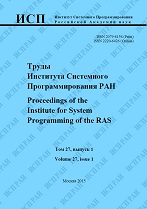|
Improving fuzzing performance by applying interval mutations
S. S. Sargsyana, J. A. Hakobyana, H. M. Movsisyana, M. S. Mehrabyana, V. T. Sirunyana, Sh. F. Kurmangaleevb
a Russian-Armenian University
b Ivannikov Institute for System Programming of the Russian Academy of Sciences
Abstract:
This paper presents a novel approach of generation effective inputs for fuzz testing. Most applications check input format before performing basic calculations. That kind of applications usually parse service information of input file to decide whether it is supported or not. Input formats which are not supported are discarded and the application finishes its execution immediately. For example, the service information of ELF (Extensible Linking Format) file should start with the following data: "0x7f 'E' 'L' 'F'". If a file does not contain this information in header section then it will not be considered as ELF. Effective fuzzing of an application which has input validation stage is a relevant and important problem. Random changes of input files usually malform service data and the target application finishes immediately without execution of main code. This makes fuzzing process inefficient. To solve this problem, we have designed and implemented three special plugins for ISP-Fuzzer. The first plugin is intended to collect execution traces. The second plugin connects fragments of input data and executed basic blocks of the target program. Based on that information we can determine potential fragments (critical fragments) of input data which should not be mutated for new test case generation. The third plugin is designed for interval mutations. It mutates input file escaping critical fragments detected by the second plugin. Experimental results prove the effectiveness of proposed method.
Keywords:
dynamic analysis, interval mutation, fuzzing.
Citation:
S. S. Sargsyan, J. A. Hakobyan, H. M. Movsisyan, M. S. Mehrabyan, V. T. Sirunyan, Sh. F. Kurmangaleev, “Improving fuzzing performance by applying interval mutations”, Proceedings of ISP RAS, 31:5 (2019), 78–88
Linking options:
https://www.mathnet.ru/eng/tisp454 https://www.mathnet.ru/eng/tisp/v31/i5/p78
|

| Statistics & downloads: |
| Abstract page: | 148 | | Full-text PDF : | 89 | | References: | 27 |
|




 Contact us:
Contact us: Terms of Use
Terms of Use
 Registration to the website
Registration to the website Logotypes
Logotypes








 Citation in format
Citation in format 